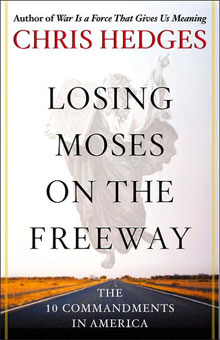Book Notes
 Chris Hedges, Losing Moses On The Freeway; The 10 Commandments In America (New York: Free Press, 2005), 206pp.
Chris Hedges, Losing Moses On The Freeway; The 10 Commandments In America (New York: Free Press, 2005), 206pp.
I suspect that for many people in our post-modern culture, the 10 Commandments evoke thoughts of moralizing television evangelists, perhaps disbelief that anyone would devote themselves to such archaic strictures, or, more commonly, sheer ignorance. In any case, that would be to our great peril, argues Chris Hedges, author of War Is A Force That Gives Us Meaning (2002).
Hedges brings a remarkable life story and degree of passion to his story-telling about these most famous Ten Words—mystery, idols, lying, sabbath, family, murder, adultery, theft, envy, greed and, in an epilogue, love. As a pastor's kid, he grew up in rural upstate New York, where his father was a Presbyterian pastor. Five years at an elite boarding school, the loneliness of his childhood, left him with "a deep hostility to authority and a visceral distaste for the snobbery of the 'well-born.'" Six days after graduating from Colgate University he began a two year stint as a pastor in the violent ghetto of Roxbury in metro Boston, an experience so unsettling that it provoked him to leave the church and seminary. After a year in South America he completed his divinity degree at Harvard, though not without caustic opinions about liberal professors who romanticized the poor whom they had never met, and the lectures which he experienced as "intellectual shell games." In a prescient understatement his father remarked to him that he was "ordained to write," and so he did, as an award-winning war correspondent in some 50 countries over 20 years.
Hedges has not written an exegetical or even theological treatise about the 10 Commandments, but rather existential reflections on them rooted in first person life experiences. He is at his best as an unvarnished prophet who unmasks the idolatries we so readily worship—the state, nation, especially in its glorification of war and legitimation (even sacralization) of violence, race, religion, ethnicity, gender, and class. At a graduation speech that he delivered at Rockford College in May 2003 the audience booed him from the stage for his critical remarks about the Iraq war. Such is the prophet's welcome. His chapter on murder recounts the tortured conscience of an Episcopal priest who estimates that he killed 300 people as a soldier in the Vietnam War. For theft he explores the breadth and depth of corporate greed through the experience of R. Foster Winans, a writer for the Wall Street Journal.
All of us struggle for moral integrity and personal authenticity, and Hedges by no means excludes himself. "The darkness I discovered in Roxbury was my darkness." No one is immune from corrosive impulses. But to flaunt the moral grammar of the universe is to court spiritual, emotional and psychological death. Hedges has experienced enough to know when and how that happens, whether in a bar in Sarajevo or a gleaming skyscraper office in Manhattan. The commandments save us from false covenants and idols that promise so much and deliver so little. In honoring the commandments, we honor the sanctity of life, the power of love, and their function to bind us together in life-affirming community.


